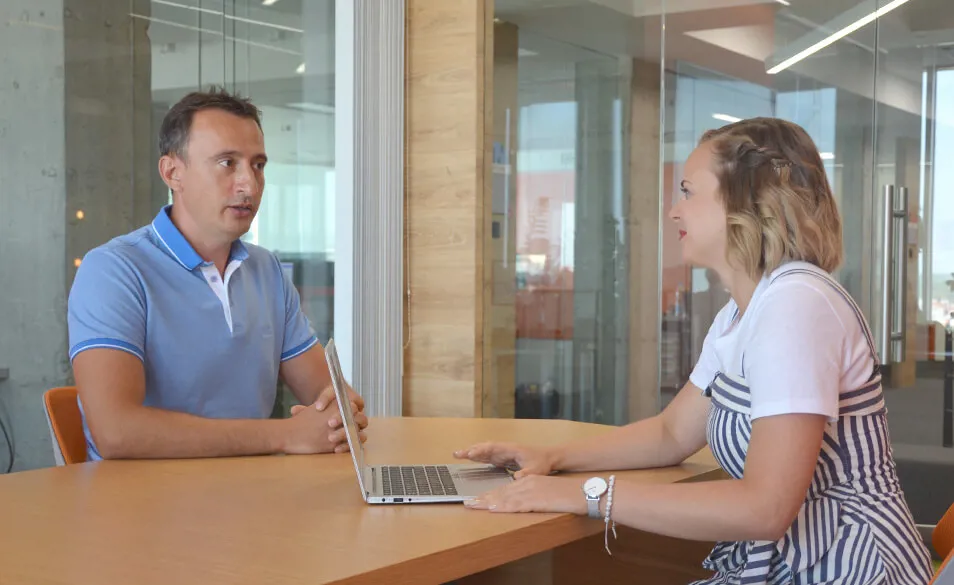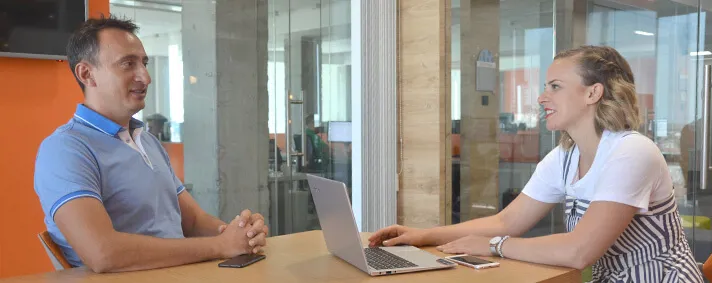What are the benefits of living abroad?

Table of contents
Very often we can hear stories about people moving abroad looking for a better life, which certainly sometimes can be a solution to the problems we face daily at their home.
The reasons one might have for leaving are numerous. But, leaving if you are quite certain why and if you know that things will be better somewhere else other than here is reason enough to move out of the country. One of the most important things, though, when leaving is good planning.
What are the benefits of living abroad?
Here are some of the reasons why people decide to live abroad:
- Better career opportunities
- Making friends and contacts all over the world
- Introducing to different cultures
- Stepping out of comfort zone
- Having more opportunities for traveling
- Learning new language
- Life with an emotional partner
A while ago we spoke about this topic with one of our founders, Vladan Ostojic. He has both lived and worked abroad, and this is why we wanted to hear about his experiences and to seek some advice on looking for a better life outside the borders of the homeland.
Upon graduating from university you decided to go abroad and work there for sometime. Could you tell us a bit more about how it all happened?
Even as a kid I had this idea of moving to Germany. Back then it seemed like the best option since where I am from, in Bosnia, people kept talking about it and it was assumed that success was achieved when you go to work and live in Germany. The idea didn’t vanish during my university years, so I kept thinking, planning and finally I decided to leave. I was curious about their work culture, I wanted to discover how things functioned there and I wished to acquire contacts with foreign companies - potential clients. In essence, it all began with Sasa and me working as freelancers, although we were both employed and we freelanced after working hours.
We loved it and we began talking to a number of business partners from western Europe - Netherlands, Switzerland, Germany, about opening a company here at home. At the time the idea was for us to partner with these clients, where they would hold the majority partnership. With most of them we couldn’t reach an agreement. We simply didn’t like the conditions that were offered to us, due to the fact that they were seeing us their inferiors. I think that perhaps in that moment we decided to establish our own company. Shortly after I left to work for a client we freelanced for. But it was certain that I was going to come back to Serbia after a while.
How long did it take you to adapt to your new surroundings and what were the first impressions?
Although I postponed it for a while, leaving was actually quite easy. I consider the act of moving to Western Europe to be very easy, especially if you are in our line of work. Everything went smoothly and quickly, without any stress whatsoever. The initial adaptation period was also simple enough since the owner of the company I went to work for made sure all was simple and carefree. What might be confusing to anyone arriving somewhere new are the administrative procedures, getting to know the new city, etc. What impressed me the most, initially, was the level of organization. Which, in time, becomes too organized making you realize that you have no room to get out of that mould and the machinery you have found yourself in.

Interview with co-founder Vladan
I believe many are interested in the advantages of living abroad, so I would like you to share with us some of the advantages but also the disadvantages of working and living abroad.
I couldn’t point out the advantages of living abroad, because essentially I couldn't find them. Perhaps there are greater possibilities for children and families, in terms of advancements and more comfortable living. But, if we look at the salaries, even if we don’t take into account the costs of living, we come to the conclusion that salaries are quite similar.
What I saw as a disadvantage is the fact that there is no much room for experimenting. The moment you get there you have a feeling that you have entered a machine of sorts, where everything is organized, where there is no room to change the rules that are imposed and that every individual strictly obeys. Paradoxically, I went there and when asked “what I liked the most” I pointed out that it was precisely that sort of organization, only to understand in time that they were right when they said “we feel everything to be too organized here”. When it comes to us I would emphasize something that, at the same time, is both a quality and a flaw - we might lack a certain level of organization, but that’s where the beauty is because we can turn that lack of organization into our advantage.
Let me use a situation of mine as an example. When I came back to Serbia I kept my apartment in Netherlands for a little while longer, but I cancelled my taxes. After a period of time I received a notification which said that it seems I am still living in the Netherlands and that I should go to the city council to apply for taxes. But the situation in Serbia is such that I spent two years living abroad without the country and government even knowing if I was here or not. And I know these things lack seriousness and organization, but this is where I see room for a more comfortable living with an opportunity to experiment more. We have the flexibility and freedom to try more things, both privately and professionally.
Could you share with us one of the moments when you realized that too much organization can be a nuisance?
There is an interesting example that can show the level of organization present even in some simple, everyday situations. One time I was waiting for transportation and I didn’t have on me the transportation card nor any change. The machine wouldn’t accept paper money so I thought I would ask the vendor in a kiosk to exchange some paper money for coins so I could buy the ticket. However, when I asked her to do so the vendor told me that she couldn’t do it because it didn’t comply with their rules. Quite surprised by this I tried to explain that I needed change to purchase the ticket but she kept saying that it wasn’t in agreement with their protocol and rules they are guided by. So I thought I would buy gum so to get change, but I didn’t get enough coins to purchase the ticket. I asked her to give me my change in coins, but she again said that she was unable to do so. She explained to me that, when giving change, they are supposed to give it beginning from the highest denomination of money to the lowest. Quite confused with this entire situation, and with a line forming behind me, I bought more gum so to have enough coins for my ticket.
Your departure is different from others because since the beginning you knew you wanted to come back and open a company with Sasa in Serbia. What was it like to work abroad while, at the same time, trying to get the company here in Serbia on its feet, and why did you want to have it operating here?
Although it was quite a stressful period it wasn’t new to me, because there was a time when I worked two full-time jobs. So I would perhaps say that it got a bit easier when I left. It did all require a lot of work and that period lasted for one year, but when we acquired enough clients and had five employees at the company, I knew that it was time to come back.
Also, opening a company anywhere is not an issue. Sasa and I always liked the idea of living and working in Serbia. We thought that it was the right decision since, regardless of the address, you have the possibility to work globally. At the time we saw that there was great demand for programmers in western Europe and we had contacts in Serbia where we could offer our friends and colleagues a job. It didn’t seem hard to get projects, getting to people was more of a challenge. Today we have a situation where more and more foreign companies are coming here looking for people, with less domestic companies trying to open offices abroad. The projects are getting here without us having offices abroad. The main reason for this is the price to quality ratio. Essentially, prices are not much lower. Salaries are quite substantial here. But there is a lack of personnel abroad. There culture is such that they don’t appreciate engineers as much as lawyers and doctors. The western intelligent people are not as interested in engineering education.Here at home things are completely different, here being “an engineer” is a social symbol. And that is what has attracted so many people to IT.
Do you think young people are informed enough about the possibilities they have at home, and are there projects interesting enough to keep them here?
When it comes to going abroad and young people, things are like this. First, here young people start with a salary significantly lower than abroad. When I spoke about salaries earlier I was referring to higher positions with more years of experience. Junior salaries are, in fact, lower when compared to foreign ones. The point is that, in Serbia, you need to work for a certain amount of time and invest effort and hard work into it in order to get to the salary that abroad is the initial one.
Frequently the problem with young people is that, just like I did, they have heard stories about going abroad and all the possibilities that entails. I think they have that impression until they get into the professional IT world. I also believe that young people are informed about the possibilities they have here at home, yet I am under the impression that they feel that getting to Germany is a success of a lifetime.
I would say that our projects are significantly more interesting. More often than not, big projects are developed for the state and it is harder to entrust them to a company abroad. Such projects are boring and they don’t come to Serbia. The truth is that we don’t have big companies like Google and Facebook, but we do have interesting Startups performing in interesting areas of technology. I think that due to the startup scene and the possibility of working anywhere in the world, there is no lack of interesting projects.
What would be your message for all those debating whether to stay or leave the country?
It is my personal feeling that people don’t leave Serbia because of salary issues. I think people idealize way too much the western lifestyle. I think the reason for leaving is that our people are annoyed by other things here. Perhaps the lack of organization I spoke about before, education, the fact that the material circumstances in their close surroundings are quite bad, something that doesn’t change with their leaving. I would advise them not to get too excited about it all. I would tell them to understand the lack of organization and rules in Serbia as an opportunity, as a freedom they can use to change something, especially personally. Especially in IT. It has never been easer to work from anywhere on a global level, and I see no reason for leaving. Although I am aware of situations that can create difficulties for people, personally I was never that annoyed here. It is all a matter of personal perception, of what you choose to hear, see and do. There are negative things, and there is room to advance different aspects of the society and the country, but I think that nothing is so negative that it could make leave for good. If we simplify things a bit more we will understand that in western countries the government asks a lot from you so you can get something in return. Here we are not obligated to be as devoted to the country which doesn’t give us much in return, but gives us our freedom. We are on our own.


